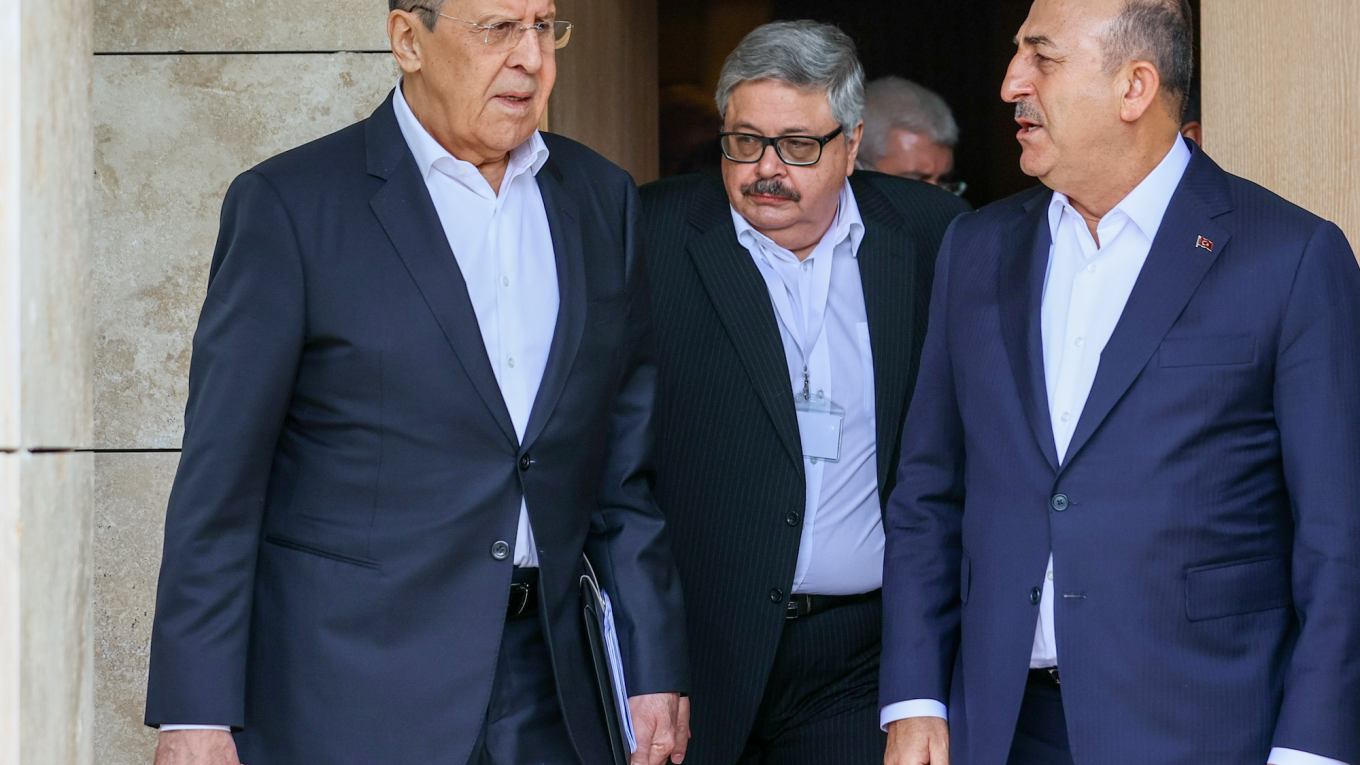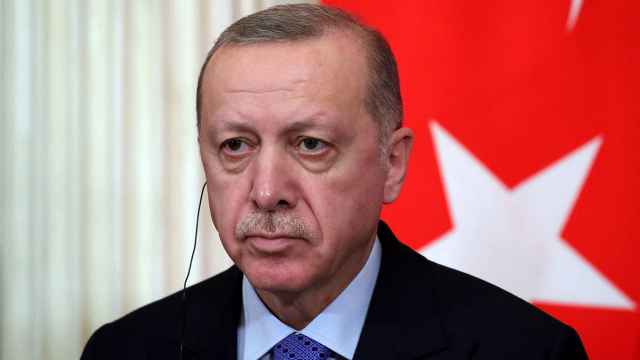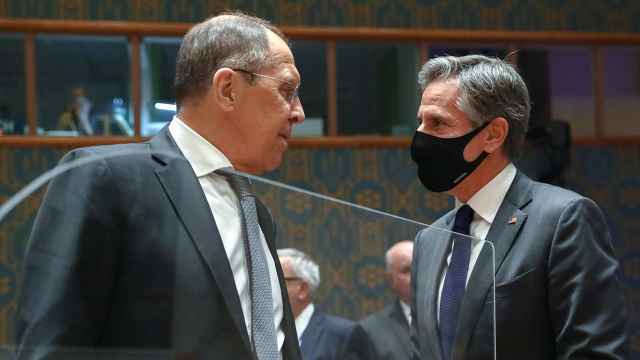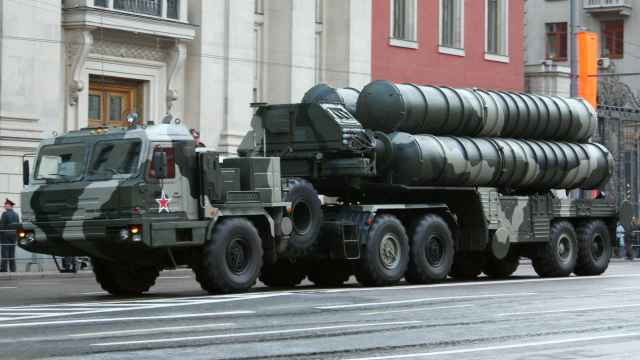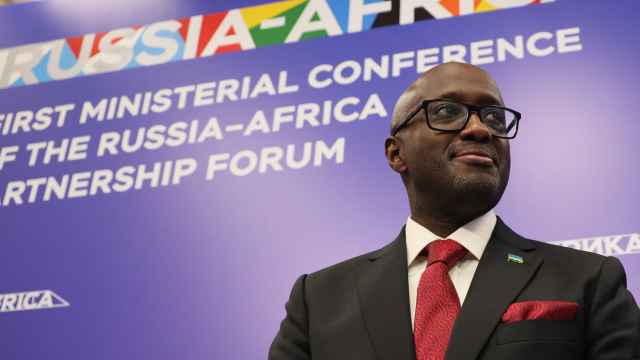Russia and Ukraine on Thursday failed to find a breakthrough on a ceasefire and other humanitarian issues at the first high-level talks between the two sides since Moscow's invasion.
Foreign Minister Sergei Lavrov and Ukrainian counterpart Dmytro Kuleba met on the sidelines of a diplomatic forum in the Turkish resort city of Antalya for three-way talks joined by Turkey's Foreign Minister Mevlut Cavusoglu.
Kuleba said "no progress" had been achieved on even a 24-hour ceasefire, expressing frustration that "it seems that there are other decision-makers for this matter in Russia."
He also repeated his vow that the country will not give in, saying "I want to repeat that Ukraine has not surrendered, does not surrender, and will not surrender."
He described the meeting as "difficult," accusing his Russian counterpart of bringing "traditional narratives" about Ukraine to the table.
He said that he would be ready to meet with Lavrov "again in this format if there are prospects or a substantial discussion and for seeking solutions."
Ukrainian and Russian delegations have also been meeting in Belarus, but the team sent by Russia to those talks is relatively low-ranking, without a minister.
Lavrov appeared to put a greater emphasis on those talks saying: "Today's meeting has confirmed that the Russian-Ukrainian format in Belarus has no alternative."
"We are in favor of any contacts... to solve the Ukrainian crisis... but the thing we realised is they must have added value and must not undermine the main track in Belarus."
Images of the meeting showed the Russian, Turkish and Ukrainian delegations sitting on each side of a 'U' shaped table, with each minister accompanied by just two other officials.
There was no indication that they had shaken hands ahead of the discussions.
Hospital attack
The meeting took place against the background of international outrage after an attack on a children's hospital in the besieged Ukrainian city of Mariupol which, according to Kyiv, killed at least three people, including a young girl.
Kuleba said he wanted to emerge from the meeting with an agreement on a humanitarian corridor from the besieged city of Mariupol but "unfortunately Minister Lavrov was not in a position to commit to it."
Kuleba said Lavrov "will correspond with respective authorities on this issue."
Lavrov claimed the hospital was serving as "as a military base for nationalists" from the radical Azov Battalion.
He also accused the European Union and other countries of "dangerously" backing the supply of arms to Ukraine.
Asked by a Turkish reporter if Russia was planning to attack other nations, Lavrov replied "we don't plan to attack other countries" and claimed "we did not attack Ukraine."
He insisted that President Vladimir Putin launched the operation on Feb. 24 as the situation in Ukraine "posed a direct threat to the Russian Federation."
Multiple initiatives
Host Cavusoglu acknowledged that the meeting was "not easy" but said that the exchanges had been "very civilized" with voices never raised in anger.
He said Kuleba had reaffirmed that President Volodymyr Zelenskiy was ready for a meeting with Putin and Lavrov had replied that Putin was not against it in principle.
"The meeting was an important start. No one should expect miracles at one meeting," Cavusoglu said.
The Turkey talks are one of a number of diplomatic initiatives underway.
Israel is seeking to broker a solution through direct talks with Putin, and French President Emmanuel Macron is also frequently phoning the Kremlin chief.
"There is today a very slim hope and we need to seize it... without being naive," France's Europe Minister Clement Beaune told France Inter radio ahead of the meeting.
Turkey is a traditional ally of Ukraine and has supplied the country with Bayraktar drones — made by a firm whose technology director is Erdogan's own son-in-law which Kyiv has deployed in the conflict.
But it is seeking to maintain good relations with Russia, on which Turkey depends heavily for gas imports and tourism revenues.
"We are working to stop this crisis transforming into a tragedy," President Recep Tayyip Erdogan said on Wednesday, adding he hoped for a permanent ceasefire.
A Message from The Moscow Times:
Dear readers,
We are facing unprecedented challenges. Russia's Prosecutor General's Office has designated The Moscow Times as an "undesirable" organization, criminalizing our work and putting our staff at risk of prosecution. This follows our earlier unjust labeling as a "foreign agent."
These actions are direct attempts to silence independent journalism in Russia. The authorities claim our work "discredits the decisions of the Russian leadership." We see things differently: we strive to provide accurate, unbiased reporting on Russia.
We, the journalists of The Moscow Times, refuse to be silenced. But to continue our work, we need your help.
Your support, no matter how small, makes a world of difference. If you can, please support us monthly starting from just $2. It's quick to set up, and every contribution makes a significant impact.
By supporting The Moscow Times, you're defending open, independent journalism in the face of repression. Thank you for standing with us.
Remind me later.


